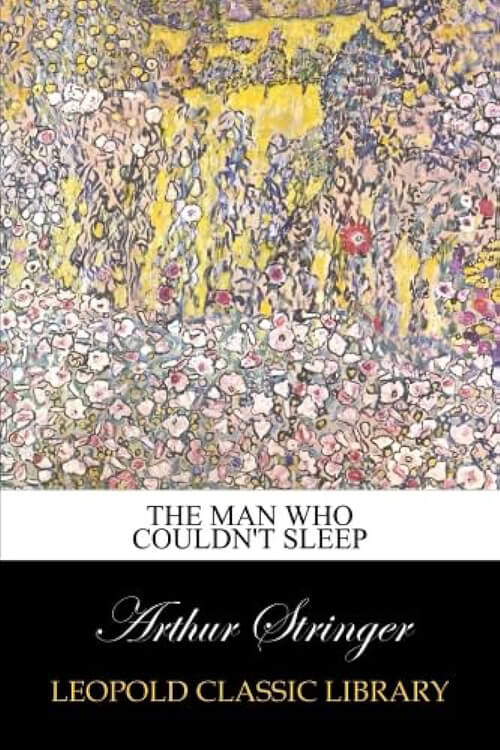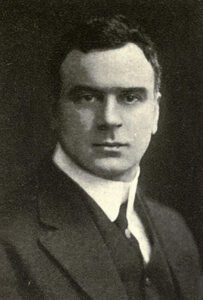
The Man Who Couldn’t Sleep
To begin with, I am a Canadian by birth and thirty-three years old. For nine of those years, I have lived in New York. My friends in that city regard me as a successful author.
There was a time when I even regarded myself in much the same light. But that period is past. I now have to face the fact that I am a failure. For when a man can no longer write, he naturally can no longer be reckoned as an author.
I have made the name of Witter Kerfoot too well known, I think, to explain that practically all of my stories have been written about Alaska. Just why I resorted to that far-off country for my settings is still more or less a mystery. Perhaps it was merely because of its far-offness. Maybe it was because the editors remembered that I came from the land of the beaver and sagely concluded that a Canadian would be most at home in writing about the Frozen North. At any rate, when I romanced about the Yukon and its ice-bound trails, they bought my stories and asked for more.
And I gave them more. I gave them blood-red fiction about gunmen, claim-jumpers, Siwash queens, and salmon fisheries. I gave them supermen of iron, fighting against cold and hunger and snarling, always snarling, at their foes. I gave them oratorical young engineers with clear-cut features and sinews of steel, battling against the forces of hyperborean evil. I gave them fist-fights that caused my books to be discreetly shut out of school libraries yet brought in telegrams from motion-picture directors for first rights. I gave them enough gun-play to shoot Chilcoot Pass into the middle of the Pacific and was publicly denominated as the apostle of the Eye-Socket School, and during the three-hundred-night run of my melodrama, The Pole Raiders, even beheld on the Broadway sign-boards an extraordinarily stalwart picture of myself in a rakish Stetson and a flannel shirt very much open at the throat, with a cow-hide holster depending from my Herculean waist-line and a very dreadful-looking six-shooter protruding from the open top of that belted holster. For business reasons, my publishers spoke of me as the Interpreter of the Great Northwest. And I exploited that territory with the industry of a badger. On my way, I mined Alaska. And it brought me in a very respectable amount of pay-dirt.
But I knew nothing about Alaska. I had never even seen the country. I “crammed up” on it, of course, the same as we used to cram up for a third-form examination in Latin grammar. I perused the atlases and sent for governmental reports, pored over the R.N.W.M.P. Blue Books, and gleaned a hundred or so French-Canadian names for half-breed villains from a telephone directory for the city of Montreal. But I knew no more about Alaska than a Fiji Islander knows about the New York Stock Exchange. And that was why I could romance about it so freely and magnificently!
Read or download Book
Arthur Stringer
Arthur Stringer (February 26, 1874 – September 13, 1950) was a Canadian novelist, screenwriter, and poet who moved to the United States.
He published 45 works of fiction and 15 other books and wrote film scripts and articles.
Early life
Stringer was born in Chatham, Ontario. In 1884, the family moved to London, Ontario, where Charles attended the London Collegiate Institute. At the Institute, he founded and edited a school magazine called Chips. He then attended University College, University of Toronto from 1892 to 1894, and later studied at Oxford University.
Career
Stringer’s first book of poetry, Watchers of Twilight and Other Poems, was published in 1894.
In 1895, he worked for the Montreal Herald. He was also published in Saturday Night and the Canadian Magazine. In 1898, he got a job with the American Press Association, moved to New York City, and began publishing in The Atlantic and Harper’s. His first poem in Harper’s “Remorse” appeared in February 1899. His first novel, The Silver Poppy, came out in 1903. In the same year, he bought a farm on the shore of Lake Erie and married actress Jobyna Howland, the original Gibson Girl. They divorced in 1914, and Stringer married his cousin, Margaret Arbuthnott.
In 1921, the Stringers moved to Mountain Lakes, New Jersey, where Arthur Stringer continued to write.
Stringer wrote crime fiction and wilderness adventures, mainly using conventional formulae. He wrote as well in many other genres, from social realism (his “Prairie” trilogy, 1915–1921) to psychological fiction (The Wine of Life (1921). He wrote early science fiction novels The Story Without a Name (1924) with Russell Holman and The Woman Who Couldn’t Die (1929).
Much of his writing was for films. Film scripts on which he worked include The Perils Of Pauline (1914), The Hand Of Peril (1916), The House Of Intrigue (1919), Unseeing Eyes (1923), Empty Hands (1924), The Canadian (1926), The Purchase Price (1932), The Lady Fights Back (1937), Buck Benny Rides Again (1940) and The Iron Claw (1941).
Stringer remained a resident of New Jersey until he died in 1950, aged 76.






